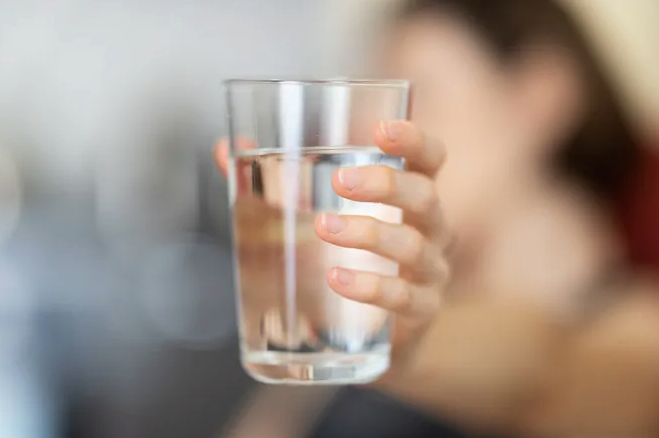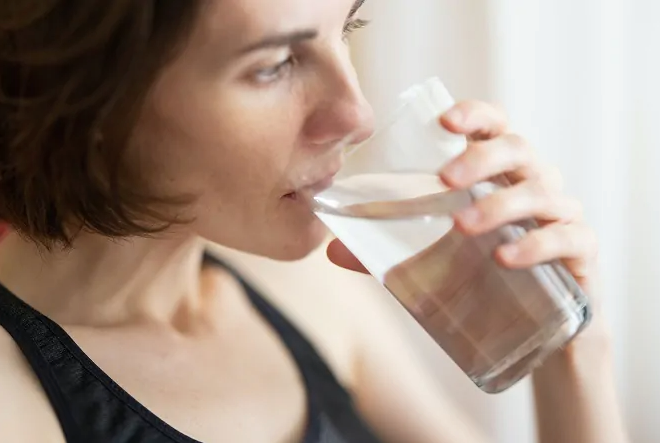Staying hydrated with water provides extensive health perks – removing waste, lubricating joints, regulating temperature. Daily recommendations suggest 2.5-4.5 liters from water, coffee, tea and other beverages.
But misinformation abounds regarding how water intake affects sleep. The truth is, properly hydrating during the day is beneficial, but moderation is key at night.
Drinking too much liquid close to bedtime means more bathroom trips which disrupt sleep. Aim to stop consuming fluids 1-2 hours before bedtime. However, a small glass can be soothing and won’t overload the bladder.
While dehydration causes sleep disturbances, having sufficient hydration earlier in the day is what matters most. Downing excessive water right before bed isn’t optimal or necessary. Focus on meeting daily intake goals then tapering as evening approaches.
Your best bet is staying adequately hydrated throughout the day. Nighttime trips to the bathroom steal precious sleep. Find the right balance to remain properly hydrated while keeping your sleep undisturbed.

Opinions differ on whether drinking water close to bedtime is beneficial. The effects seem to depend on individual factors like age, weight, and health status. Proper daily hydration is always important, but moderation is key at night.
A small glass of water before bed may prevent dehydration and dry mouth overnight without necessarily waking you up. But downing copious amounts too close to sleep can mean frequent disruptive bathroom trips.
Focus on meeting hydration needs earlier in the day. Avoid drastically ramping up intake in the 1-2 hours before bed – this overloads the bladder when your body is trying to relax. Nighttime trips steal quality sleep time.
Aim for a balance. Drink sufficient water during daytime hours, then taper as evening sets in. Address any hydration-related sleep issues like sleep apnea or restless legs syndrome. With the right routine, you can remain properly hydrated while keeping your sleep undisturbed.

While hydration needs can be met primarily through daytime intake, a small amount of water before bed can offer benefits like:
Preventing dehydration – Nighttime water loss can occur, evidenced by dry mouth, increased temperature or cramps that disrupt sleep. Sipping water can restore hydration if your body signals thirst.
Regulating temperature – Water helps regulate body temp, which supports sleep. This is especially useful on hot nights when overheating causes restlessness.
Lessening nightmares – Some studies found water associated with dreaming less or having more positive dreams. Proper hydration may impact neurotransmitters tied to nightmares.
However, moderation remains key. Downing excessive amounts shortly before bed can overload the bladder, causing frequent wake-ups. Focus on consistent daytime hydration, then drink modestly as needed in the evenings.
Stay in tune with your body’s signals. Address occasional thirst with small sips rather than large amounts. Find your optimal balance between properly hydrating and maintaining undisturbed, quality sleep all night long.
Water supports the body’s natural detoxification overnight. It increases circulation and sweating, which eliminates excess salts and cleanses the skin of toxins that build up daily. Proper hydration aids this process of overnight cleansing.
Water can also alleviate headache symptoms, especially migraines. Studies show hydration reduces headache pain and frequency. This is useful when a severe headache disrupts sleep.
However, hydration works best when maintained throughout the day. Nighttime is a chance for the body to rebalance hydration on its own terms. Drink sufficient water morning to evening, then taper as bedtime nears.
Overall, support your body by staying hydrated during waking hours. This allows natural overnight detox and recovery. Address occasional thirst with small sips of water, but avoid overloading fluid intake close to sleep. Find your optimal balance for hydration and undisturbed rest.
The primary downside is increased risk of nocturia – repeatedly waking to urinate during the night. Consuming too much fluid before bed can overload the bladder, causing frequent disruptive bathroom trips.
This impairs sleep quality and consistency. It’s especially problematic for those prone to nocturia like older adults. Frequent nighttime urination leads to exhaustion and other issues.
To avoid this, limit fluid intake 1-2 hours before bedtime. Be cautious about drinking large amounts close to sleep. Stay hydrated sufficiently earlier in the day instead.
Determine what amounts cause overnight wake-ups and adjust accordingly. Small sips may hydrate without overfilling the bladder. Find your personal threshold to reap water’s benefits while keeping sleep undisturbed.
Moderation and self-awareness are key. While proper hydration is essential, downing excessive water before bed can hinder quality rest. Prioritize daytime intake, evaluate your needs, and tweak your pre-bedtime routine.

The ongoing debate surrounding pre-bedtime hydration underscores the importance of finding balance based on your individual needs. Proper daytime hydration provides the bulk of your fluid requirements. Determine if occasional small sips before bed aid or hinder your sleep.
Monitor symptoms of dehydration like dry mouth and muscle cramps that might be alleviated by modest nighttime intake. Be mindful not to overload your bladder and cause disruptive bathroom trips. As we age, nighttime hydration often requires more care.
In the end, optimizing sleep and health depends on maintaining adequate hydration around the clock while respecting your body’s cues. Drink sufficient water during daytime hours, taper intake as bed nears, and adjust your pre-bedtime routine accordingly. With self-awareness, you can harness water’s full benefits for your wellbeing.

